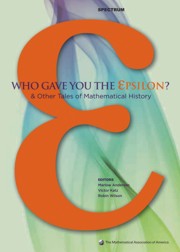Book contents
- Frontmatter
- Introduction
- Contents
- Analysis
- Geometry, Topology and Foundations
- Algebra and Number Theory
- Foreword
- Hamilton's Discovery of Quaternions
- Hamilton, Rodrigues, and the Quaternion Scandal
- Building an International Reputation: The Case of J. J. Sylvester (1814–1897)
- The Foundation Period in the History of Group Theory
- The Evolution of Group Theory: A Brief Survey
- The Search for Finite Simple Groups
- Genius and Biographers: The Fictionalization of Evariste Galois
- Hermann Grassmann and the Creation of Linear Algebra
- The Roots of Commutative Algebra in Algebraic Number Theory
- Eisenstein's Misunderstood Geometric Proof of the Quadratic Reciprocity Theorem
- Waring's Problem
- A History of the Prime Number Theorem
- A Hundred Years of Prime Numbers
- The Indian Mathematician Ramanujan
- Emmy Noether
- “ Marvelous Proof,”
- Afterword
- Surveys
- Index
- About the Editors
Building an International Reputation: The Case of J. J. Sylvester (1814–1897)
from Algebra and Number Theory
- Frontmatter
- Introduction
- Contents
- Analysis
- Geometry, Topology and Foundations
- Algebra and Number Theory
- Foreword
- Hamilton's Discovery of Quaternions
- Hamilton, Rodrigues, and the Quaternion Scandal
- Building an International Reputation: The Case of J. J. Sylvester (1814–1897)
- The Foundation Period in the History of Group Theory
- The Evolution of Group Theory: A Brief Survey
- The Search for Finite Simple Groups
- Genius and Biographers: The Fictionalization of Evariste Galois
- Hermann Grassmann and the Creation of Linear Algebra
- The Roots of Commutative Algebra in Algebraic Number Theory
- Eisenstein's Misunderstood Geometric Proof of the Quadratic Reciprocity Theorem
- Waring's Problem
- A History of the Prime Number Theorem
- A Hundred Years of Prime Numbers
- The Indian Mathematician Ramanujan
- Emmy Noether
- “ Marvelous Proof,”
- Afterword
- Surveys
- Index
- About the Editors
Summary
James Joseph Sylvester—prolific, gifted, flamboyant, egocentric, cantankerous. At the time of his death in London on 15 March 1897, Sylvester's reputation internationally as one of the nineteenth century's principal mathematical figures had long been secure. He had worked hard to assure this. Obviously, he had done much seminal work in building the theory of invariants, and this had contributed to his renown. Yet, Sylvester had felt compelled to establish ties directly with mathematicians at home—but more importantly abroad—in order to make his name known. Was this just a matter of egocentrism, or did other factors contribute to his international focus? What did it take to become an internationally recognized British mathematician in the latter half of the nineteenth century, when first France and then Germany very much set the mathematical standard? Why was this even important? As the centenary of Sylvester's death brings historians and mathematicians together in England to celebrate his life and research, we examine some of the reasons why Sylvester valued the international mathematical arena so highly and how he used it to his advantage during the course of his career.
It is well known that Sylvester, as a Jew, was, like all non-Anglicans, debarred by the Test Acts from taking the Cambridge degree he had earned as Second Wrangler in 1837 and from holding a Cambridge fellowship or professorship. His first position, the professorship of natural philosophy at non-sectarian University College London, was too far from his real interests and expertise to satisfy him,
- Type
- Chapter
- Information
- Who Gave You the Epsilon?And Other Tales of Mathematical History, pp. 220 - 229Publisher: Mathematical Association of AmericaPrint publication year: 2009

